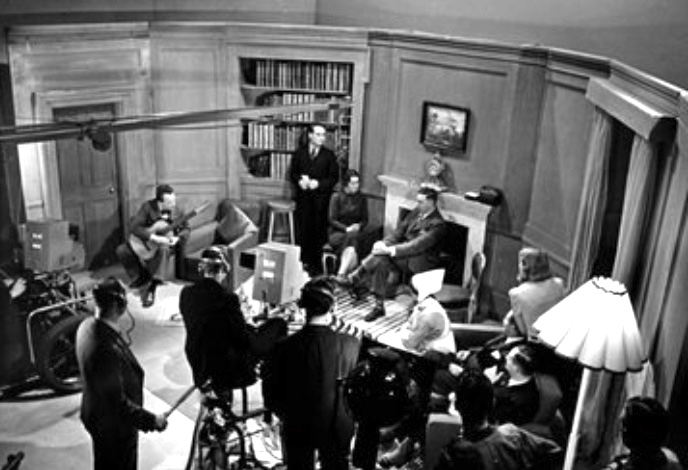OTD in early British television: 6 March 1939

John Wyver writes: Late – well, 10.24pm, delayed because of a boxing bout – on the the evening of Monday 6 March 1939, the fifth edition of a series called Guest Night (above) gathered six guests and host A.G. Street to discuss ‘the refugee problem’. This was just 9 days before German troops marched into Czechoslovakia, prompting a significant increase in the number of people fleeing the Nazis.
Guest Night was a bit like Channel 4’s celebrated After Dark series, bringing together a disparate group of people to discuss a theme, albeit with a roughly 45-minute time slot. As can be seen from the photograph, the set was a comfortable middle-class drawing room, perhaps one rung above the kind of domestic setting where many of the audience would be watching.
There are no recordings or transcripts, but it is intriguing just to recognise that television was tackling a subject that remains at the forefront of political discussion today. Among the questions they addressed apparently were, What does England look like and feel like to those who seek asylum within her shores? What is the attitude of English people to these strangers and refugees?
The regular chair was the genial A.G. Street, a farmer, writer and radio broadcaster, who was also fronting television’s monthly On the Farm OBs. The guests included adminstrator Sir Henry Bunbury and writer and activist Lilo Linke, as well as a quartet defined at least in the billing by their personal relationships or professions: Madeleine Kent, described as an English woman married to a German; Nurse Ellen, ‘a young Jewish nurse from Germany’; Kurt, a German photographer; and businessman F. Adler.
Sir Henry was a distinguished civil servant who had served in various government positions, including from 1920 onwards as Accountant-General of the General Post Office, a position he held until he retired in 1937.
At the time of the broadcast Bunbury was administering the German Jewish Aid Committee, which was a relief organisation founded as the Jewish Refugees Committee in 1933 by the banker and philanthropist Otto Schiff. Its aim to help to arrange for the admission of refugees to Britain as well as their maintenance, training, employment or re-migration. Later in 1939 Bunbury was also involved in running the Czech Refugee Trust Fund.
Lilo Linke was borh in Berlin in 1906 and was involved with various left-wing organisations. According to LibraryThing,
On a trip to England [in 1932], she visited a Labour Party Congress in Scarborough and met the English writer Storm Jameson (Margaret Chapman). Two years later, when the Nazi regime came to power in Germany, she fled to England at Jameson’s invitation. Her autobiographical book Restless Flags: A German Girl’s Story, published in 1934, established her as a writer and as a member of political and literary émigré society in London.
How frustrating it is that the exchanges of this group are lost to history.
Leave a Reply